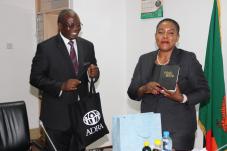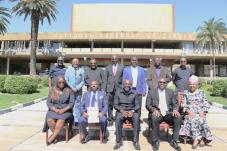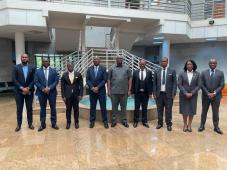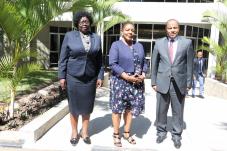- Home
- About Parliament
- Members
- Committees
- Publications
IPU e-Bulletin No. 6, 30th June 2015
World Speakers to focus on democracy, peace and development - Preparations for the Fourth World Conference of Speakers of Parliament, taking place at UN Headquarters in New York from 31 August-2 September, are being finalized with a focus on placing democracy at the service of peace and sustainable development. The Conference Preparatory Committee, comprising some 25 Speakers, members of the IPU Executive Committee and the representative of the UN Secretary General, met in Geneva in June to agree to the agenda, format and main documents of the Conference. The meeting provided an opportunity for dialogue with Michael Møller, Acting Director General of the UN Office in Geneva, on avenues to further enhance the strategic partnership between the UN, parliaments and IPU. The Conference is part of the series of high-level meetings leading up to the UN Summit in September, which is expected to adopt a new generation of Sustainable Development Goals (SDGs). In addition to the role of parliaments in implementing the SDGs, the Speakers will also discuss the challenges and opportunities faced by parliaments in exercising their oversight role, as well as ongoing efforts to ensure that gender equality is placed at the heart of the work of parliaments. The Conference, convened by IPU every five years, provides a unique global forum for parliaments at the highest level to find common ground on global challenges. Speakers and their delegations still have time to register for the event. Follow the Conference build-up on Twitter using the hashtag #Speakersconf
IPU Secretary General pushes ahead on Pacific parliamentary engagement – In a high-level and wide-ranging visit to Australia and New Zealand, IPU Secretary General Martin Chungong has pushed forward on ways to strengthen IPU’s engagement with Pacific parliaments. The mission, which included talks with the New Zealand Prime Minister John Key, the Speakers of both houses of parliament in Australia and New Zealand, the Speakers from the Cook Islands, Fiji, Samoa and Tonga, as well as government and human rights officials, was the latest step by the IPU Secretary General in efforts to achieve universality for the Organization, a priority for his mandate.
With seven Pacific parliaments currently non-members of IPU, there was agreement on the need to mobilize the region in its interaction with IPU. Ways to achieve this included creating a Pacific sub-group within the Organization to push forward a Pacific agenda, a tripartite arrangement between IPU and the Australian and New Zealand Parliaments to support Pacific island parliaments whilst discussions in Wellington with Speakers from the sub-region focused on better understanding their specific concerns and identifying how these could be factored into IPU’s programme work.
Strengthening parliamentary action on maternal and child health in Bangladesh – The Bangladesh Parliament and IPU have signed an agreement setting in motion a partnership aimed at developing the capacity of the country’s MPs to promote maternal and child health (MNCH), including efforts to end child marriage. The agreement, signed in Dhaka during an official visit to the country by IPU Secretary General Martin Chungong and Senior Secretary of the Parliament Ashraful Moqbul, will focus on how parliament can improve its oversight and representation responsibilities on MNCH, develop strategies on strengthening parliament’s influence on the issue, including community outreach and advocacy, and the importance of data collection on birth and marriage registrations, A range of activities supported by IPU will begin soon. Although Bangladesh is one of a few developing countries that have achieved the Millennium Development Goal on reducing child mortality, and made progress on maternal mortality, there is still work to be done to reduce maternal mortality to 140 per 100,000 live births. The persistence of harmful practices against women and girls, including child marriage, and the lack of universal access to health are key challenges.
IPU human rights mission to Malaysia includes Anwar Ibrahim prison visit - An IPU human rights delegation has begun a three-day mission to Malaysia which includes a prison visit to jailed former opposition leader Anwar Ibrahim. A three-member IPU team from the Organization’s Committee on the Human Rights of Parliamentarians will assess the conditions in which Anwar is being held amid concerns that the 67-year-old is in increasingly frail health. A meeting will also be held with his wife and daughter. Anwar is serving a five-year prison term after losing a lengthy court battle to clear his name of sodomy charges. The conviction also resulted in the loss of his parliamentary mandate.
The IPU mission will similarly seek further information and clarification on the alleged human rights violations of at least eight opposition MPs – including Anwar’s daughter Nurul Izzah Anwar. The MPs are either facing sedition charges or are under investigation for having taken part in a demonstration calling for Anwar’s release. Nurul Izzah was briefly arrested in March after criticising the judiciary for her father’s conviction during a speech in parliament.
Fresh focus on plight of Eritrean MPs - The case of 11 Eritrean MPs detained 14 years ago and whose fate is of serious concern to IPU, has been highlighted by the UN Commission of Inquiry investigating the human rights situation in the country. The MPs were among 15 who signed an open letter supporting democracy in 2001. The Commission’s report, presented to the Human Rights Council in Geneva on 23 June, calls for the MPs’ immediate and unconditional release. It accuses the government of systematically silencing all critics, describing the purge of the MPs as the most visible sign of this repression. The report also finds that widespread human rights violations, some of which may constitute crimes against humanity, continue to be committed. Unseen since their arrest and with no information on their whereabouts or condition, IPU has continued to express its grave concern over the fate of the 10 men and one woman whose case IPU’s Committee on the Human Rights of Parliamentarians has been working on. The Organization has called the failure by the Eritrean authorities to charge, try or release the MPs a flagrant breach of the national constitution and the African Charter on Human and People’s Rights. Most if not all the MPs are feared to have died in the harsh conditions of their imprisonment.
Colombian MP receives formal apology for unjust prosecution - A Colombian parliamentarian who was wrongly held and prosecuted on charges of links with members of paramilitary groups has received a formal apology from national authorities. IPU had expressed serious concerns about whether Carlos García Orjuela was receiving a fair trial during the proceedings against him. He was eventually acquitted in 2010 after a two-year fight to clear his name. An official ceremony has now been held during which the Colombian Prosecutor’s Office offered García Orjuela a formal apology for the unjust accusations, prosecutions and detention he suffered. As his case was being heard in the Supreme Court, he would have had no right of appeal had he been convicted. A former Speaker of the Colombian Congress and a Senator at the time of his arrest, García Orjuela also holds French nationality. His case was among those taken up by IPU’s Committee on the Human Rights of Parliamentarians, which tackles human rights violations of MPs throughout the world. The Committee is currently working on 289 cases, including 59 murders.
Assessing progress on engaging parliaments on human rights - Efforts to strengthen parliaments’ engagement on human rights were examined in the latest measure to bridge the work of parliamentarians with that of the Human Rights Council. Diplomats, human rights officials and civil society representatives attended an event held in parallel to the 29th session of the Human Rights Council in Geneva to assess what progress had been made on engaging parliaments in key UN processes and to look at successful examples of parliamentary human rights work. The meeting was organized by IPU and the UN’s Office of the High Commissioner for Human Rights (OHCHR), and supported by Romania, Philippines, Morocco, Uruguay and Ecuador.
New move to strengthen women’s rights in Mali – IPU and the National Assembly of Mali have launched a two-year initiative to improve the status of women and strengthen their rights. The project aims to support parliamentary bodies responsible for gender issues, and back parliamentary efforts to develop the legislative and political framework needed to improve women’s status. Training for MPs in late June will focus on developing the capacity and leadership skills of female MPs and on strengthening male and female MPs skills in advocating gender equality and fighting violence against women and girls. Priorities for parliamentary action include national reconciliation, gender equality, improvements in healthcare for women and children, better education for girls, combating violence, and women’s participation in decision-making. Women hold only 13 of the 147 seats in parliament – fewer than 9 per cent - although this represents a substantial improvement on previous figures.
Supporting new Tunisian MPs – IPU and partner organizations have joined forces to provide a series of orientation workshops for Tunisian MPs elected late last year to the country’s first parliament since the Arab Spring. In a first session organized by IPU and the UN’s Development Programme (UNDP), the MPs focused on standards for democratic parliaments based on IPU’s Parliament and democracy in the 21st century and measures to put in place a gender equal parliament using the Organization’s Plan of Action for Gender-sensitive Parliaments. The MPS are due to explore the essential functions of parliaments – law-making, oversight and representation at another session in September. Meanwhile, at an event organized by IPU and International IDEA and supported by the UAE’s Federal National Council, the MPs focused on increasing cross-party cooperation between female MPs through both formal and informal means. Tunisia is one of only two Arab countries where more than 30 per cent of the MPs are women through the use of electoral quotas. Algeria became the first Arab country to achieve this.
Libyan MPs meet IPU officials - Five Libyan women MPs visited IPU Headquarters to discuss reviving cooperation between IPU and the internationally-recognized Libyan Parliament. The parliament is currently operating with very limited means from the port city of Tobruk after the security situation forced it to relocate from Benghazi. Some Arab countries are providing assistance to the parliament, but the MPs stressed the need for assistance from IPU, including capacity-building activities for parliamentarians and parliamentary staff. The Libyan representatives described the dire situation in the country, emphasizing the lack of stability and security.
IT project aids Egyptian Parliament - A three-month IPU programme to train staff at the Egyptian parliament is the first stage in efforts to establish a modern parliamentary library with full internet access and capable of meeting the needs of future MPs. The newly-launched programme, supported by the Japanese foundation Worldwide Support for Development (WSD), includes training 210 staff in information technology management relating to the provision of library, information and research services (LRIS) - one of the priorities identified during a needs-assessment mission to Egypt in late 2014. The training, together with a recently installed faster computer system, will enable staff to use IT and the internet more effectively.
MPs identify strategies for implementing new SDGs – MPs from nine European and Central Asian countries gathered in the Romanian capital, Bucharest in mid-June to identify how parliaments can be most effective in implementing the new Sustainable Development Goals (SDGs). They recommended that each country should devise its own sustainable development strategy, identifying specific goals and the means of achieving them with input from relevant parties including women’s groups. MPs at the two-day regional seminar also urged parliaments to promote strong inter-parliamentary cooperation, including the development of joint projects between countries. It recommended IPU set up a global parliamentary mechanism to track and evaluate progress so that national and regional experiences can be fed back to the global level and encourage further progress. The seminar, jointly organized by IPU and Romania’s Chamber of Deputies, was attended by MPs from Bosnia and Herzegovina, Bulgaria, Czech Republic, Croatia, Georgia, Hungary, Kazakhstan, Serbia and Romania.
Young MPs highlight development cooperation concerns – Young MPs participating at the IPU Global Conference of Young Parliamentarians in Tokyo put their minds to how development cooperation could better respond to young people’s needs at an event organized by IPU and Worldwide Support for Development (WSD). The meeting offered a platform for young politicians to illustrate how well-placed they are to help shape more effective partnerships to tackle poverty, migration, discrimination and other major global challenges. The young MPs called for greater investment in training, job creation, inclusive processes and responsive programmes. About 1,000 people, including key guests WSD Chairman Dr Haruhisa Handa, IPU President Saber Chowdhury, IPU Secretary General Martin Chungong and Japanese Minister of State for Foreign Affairs Minoru Kiuchi, as well as members of the public, attended the event.
Seychelles Parliament works at boosting media relations - The National Assembly of the Seychelles is continuing efforts to harmonize relations and forge an ever more fruitful partnership with the Seychelles parliamentary media. Training organized last month by the National Assembly and IPU, in collaboration with Fondation Hirondelle, a Swiss organization that works to strengthen media and democracy, and Australia’s State Parliament of Victoria, resulted in identifying ways to improve reporting of the work of the National Assembly.




